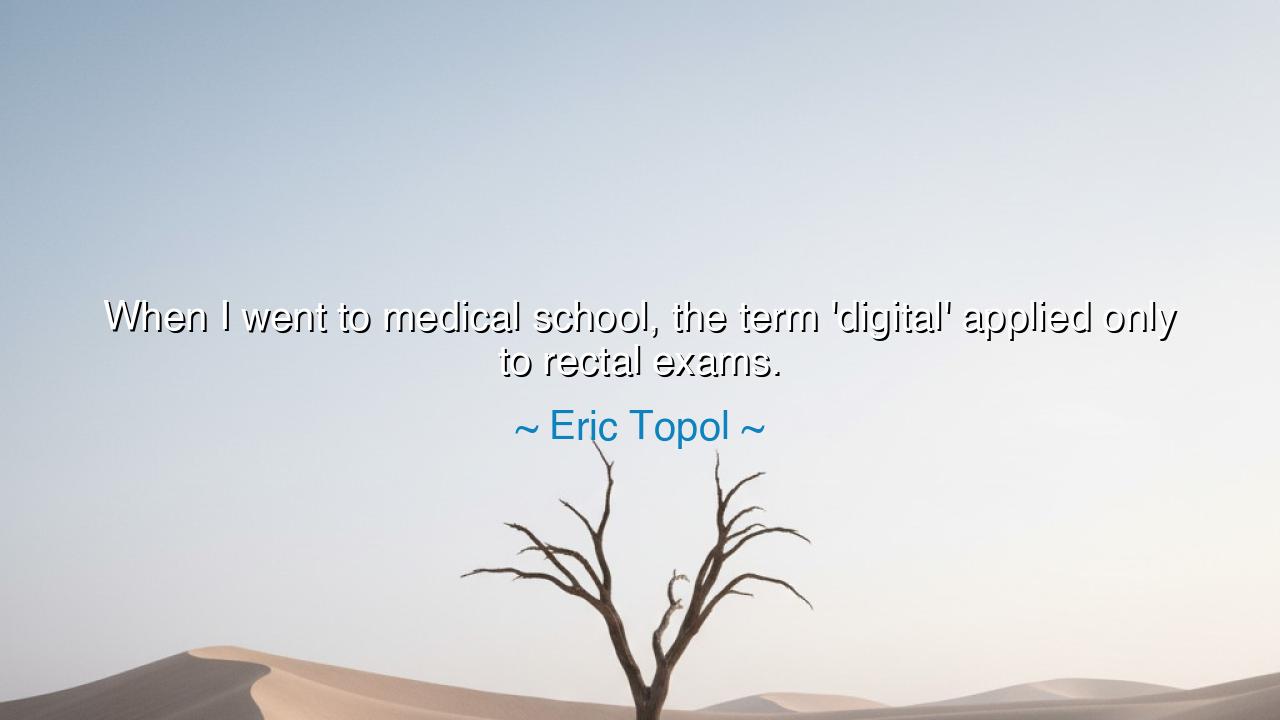
When I went to medical school, the term 'digital' applied only to






In the words of Eric Topol, physician, scientist, and herald of the digital age in medicine, there lies both humor and revelation: “When I went to medical school, the term ‘digital’ applied only to rectal exams.” At first, his words may stir laughter, but beneath that laughter dwells a profound reflection on the transformation of medicine — from the age of the hand and stethoscope to the age of algorithms and artificial intelligence. It is a statement that marks the passage from the analog to the electronic, from the tactile to the technological. It is, in truth, the story of how the healer’s world has been remade.
When Eric Topol began his training as a doctor, the tools of medicine were humble — the hand, the eye, the ear, and the heart of the physician were the instruments of healing. The word “digital”, in those days, referred only to the finger, derived from the Latin digitus. To perform a “digital exam” was to heal through touch, to gather truth through direct connection with the body. The doctor’s finger — simple, human, and unadorned — was the bridge between knowledge and the mystery of life. Yet today, the word “digital” has been reborn, not in flesh, but in code — it speaks now of data, devices, networks, and machines. Topol’s jest, then, is not merely humor — it is the testimony of one who has witnessed the revolution of medicine itself.
For in our time, the physician no longer works alone with their senses. Around them hums the power of the digital realm — of smartphones that record heart rhythms, watches that measure sleep and oxygen, and vast networks of data that chart the inner workings of humanity. In a single lifetime, medicine has leapt from the hand to the cloud. Topol, as both witness and participant, reminds us that what was once physical has become virtual, that the healer’s reach now extends not only through touch, but through information. Yet he speaks not in despair, but in wonder — for in this transformation lies the promise of democratized medicine, where knowledge and care are no longer confined to hospitals, but flow freely through every device and every person who seeks to understand their own body.
But even as he celebrates this progress, Topol carries a physician’s caution. For while the digital has expanded our reach, it must not replace our humanity. The danger of the digital age is not in its power, but in its distance — that we may begin to mistake data for understanding, and numbers for compassion. In the ancient world, the healer’s touch was sacred because it united empathy with skill. The patient did not feel like a case or a statistic, but like a person seen and heard. As we move deeper into this new realm of sensors and screens, Topol warns us — subtly, wisely — to remember the sanctity of that touch.
History, too, speaks to this lesson. In the 19th century, when the stethoscope was first introduced, many doctors resisted it. They feared it would come between physician and patient, replacing listening with technology. But in time, the stethoscope became an extension of the doctor’s ear — a tool that deepened, not diminished, the art of care. So too, Topol believes, must the digital revolution serve humanity, not divide it. The true healer will not abandon compassion for convenience, nor replace presence with pixels. Instead, they will merge the two — the wisdom of the hand with the power of the machine — to create a medicine more personal, more precise, and more humane than ever before.
Topol’s words remind us that progress, though inevitable, must be guided by purpose. The digital age offers humanity tools of immense potential — but it is the soul that must steer them. For what use is the finest algorithm if it cannot comfort the dying? What value is the greatest dataset if it cannot teach us mercy? Technology can diagnose, but only the heart can heal. The physician of the future must therefore be both scientist and sage — mastering code, but never forgetting compassion.
So, my children, let this be your lesson: embrace the digital, but do not forsake the human. Let technology expand your reach, not replace your care. Learn the tools of the new age, but hold fast to the ancient virtues of empathy, patience, and presence. For healing is not only in what we know, but in how we serve.
And when you look upon the glowing screens of your age, remember Eric Topol’s wry and timeless truth — that there was once a time when “digital” meant the hand of a healer upon the body of the sick. Let that image guide you: that no matter how advanced our instruments become, the true power of medicine will always begin — and end — with the touch of humanity.






AAdministratorAdministrator
Welcome, honored guests. Please leave a comment, we will respond soon